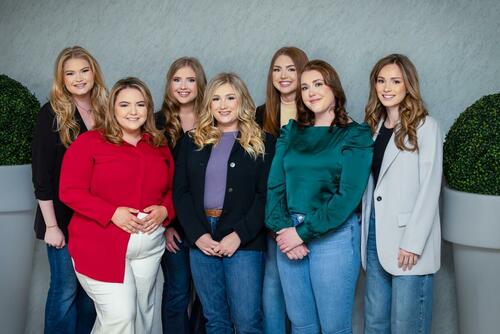
Authored by Michael Wing via The Epoch Times (emphasis ours),
The younger woman spoke through tears, telling Patsy Levang how a biological male had been admitted into Kappa Kappa Gamma, the on-campus women’s sorority house where she lives at the University of Wyoming. The newly-minted male member has free access to areas where men are strictly banned: that includes hallways, lockless bathrooms, and changing areas. “I don’t think anyone cares,” Hannah Holtmeier told Levang, the former Kappa Foundation president who bid the organization farewell in 2012.

The women were “shocked” and “caught off guard” by the 6-foot, 2-inch, 260-pound individual, Artemis Langford, 21, who identifies as female and gained unfettered access to the girls-only quarters of the second floor. Witnesses reported seeing him couched in the common area, not studying, for hours; sidling in and standing silently in the corner of the room while the women changed; becoming visibly aroused—mind and body reacting as a man—while watching them. His distinctly male response was visible through his leggings, they allege. Other times he kept a pillow on his lap.
The women spoke of more awkward moments: his allegedly photographing them during a sorority slumber party; repeatedly questioning them about female body parts; refusing to leave said slumber party until “after you fall asleep.” It felt “weird” and “gut-wrenching” being around him, they said, and “quite a few” Kappa Kappa Gamma members, particularly from Langford’s batch, had left.

Having heard similar complaints from other women’s Greek and sport groups, Levang has since decreed the trans movement “the women’s rights issue of our time.” If headquarters pushed Kappa Kappa Gamma to become co-ed, breaking with 151 years of tradition, they would surely see the organization “go down the drain,” she told The Epoch Times. “We had to step up and do something.”
Levang listened, and shortly thereafter joined Holtmeier and half a dozen other Kappa women to launch a lawsuit against the sorority’s national leadership. They claim they were promised a sisterhood and a haven where they would feel safe in their own homes while forging lifelong female friendships. By inducting a male member, they added, the sorority not only violated its own guidelines, but the bylaws.
The University of Wyoming newspaper, Branding Iron, previously quoted Langford saying, “I feel so glad to be in a place that I think not only shares my values but to be in a sisterhood of awesome women who want to make history” and, “They want to break the glass ceiling, trailblazing you know, and I certainly feel that as their first trans member, at least in the chapter in Wyoming history.” Plaintiff Allison Coghan would tell Fox News’ Laura Ingram, “No, we certainly did not [sign up for trailblazing]” when they joined Kappa Kappa Gamma.
In March 2023, the women filed a legal complaint in the U.S. District Court for Wyoming, which reads:
An adult human male does not become a woman just because he tells others that he has a female ‘gender identity’ and behaves in what he believes to be a stereotypically female manner.
The Fraternity Council has betrayed the central purpose and mission of Kappa Kappa Gamma by conflating the experience of being a woman with the experience of men engaging in behavior generally associated with women.
Pushing for Kappa’s First Trans Sorority ‘Sister’
Levang alleges Langford didn’t measure up to join the sisterhood, yet was given preferential treatment by national headquarters. Since its founding in 1870, Kappa Kappa Gamma has aimed to level the playing field for young women competing in academics against men, yet there are checks at the gate; not just any woman can enter. Like a job interview, a formal recruitment process seeks quality applicants. “He was non-communicative, he didn’t engage,” Levang said. “The women found him not to be a fit; he just didn’t mesh in well, so … he was removed from the formal recruitment process.” Langford entered through a loophole and pressuring from the sorority’s national leadership, but it was done improperly.
The girls were supposed to have a closed-ballot vote whether to accept Langford, but that wasn’t followed. “They were forced to have their ballot open on email and then they were told that if they didn’t have their vote open, or if they voted no, that they would be visited with,” Levang said. “I would say it was bullying, intimidation, kind of a threat against them if they didn’t vote yes.”

Ordinarily, the sisters have to live at the fraternity house they belong to. Langford was granted a special exemption allowing him to join while living off-campus. “It’s quite costly to pay for your living at Kappa house because you’re paying for food; you’re paying for a place to sleep at night; you’re paying for the living room; a place to do your studying,” Levang said. “He’s getting exemptions that nobody else is getting; they’re giving him partial treatment.” Now there are plans for him to move in with the women before fall 2023.
Langford received other exemptions. Despite his 1.9 GPA falling well below the requisite 2.7 GPA to join Kappa, he was given a pass.
Mary Pat Rooney, the fraternity’s council president, and the members of Kappa council in 2018 reportedly issued a memorandum titled, “Guide for Supporting our LGBTQIA+ Members,” requiring sorority chapters to admit “individuals who identify as women.”
The complainants now allege the University of Wyoming chapter was pressured to induct its first transgender member to raise its prominence and curry favor with the national sorority leaders.

Incensed by all this, the sisters and several witnesses turned to Long Horn Legal. Arguing that said guide alters neither the bylaws nor other governing documents, such as Title IX, they accuse the sorority of breaching its fiduciary duty to its female members. The women are suing for the court to ban Langford’s membership and declare that men cannot join. The Epoch Times contacted the defendants for comment. In a response, the sorority told Fox that the lawsuit “contains numerous false allegations” and that “Kappa Kappa Gamma values diversity and does not discriminate based on classes protected by state, local or federal law.” The hearing is expected to be held this fall, Levang says.
More Women Fighting the Left for Women’s Rights
A traditionally progressivist domain, women’s rights have become a battleground, again, with transgenderism encroaching on women’s sports, and now, it would seem, academics. Yet more women have started pushing back. Last month, 12-time All-American female swimmer for the University of Kentucky Riley Gaines broke silence about a race where she tied with trans swimmer Lia Thomas in 2022 where the judges decided in his favor for the sake of a “photo op;” while female swimmers have been chilled from criticizing Thomas, Gaines has spoken out loudly and, recently, has inspired female swimmer Paula Scanlon, a teammate of Thomas’s at Penn State, to follow suit; in June Scanlon revealed that the NCAA wrote her team in an email “you will regret it” if they dared to raise objections to Thomas. The trans swimmer, they stated, was to be accepted in the name of inclusivity.
Levang understands how employing words like “inclusivity” or “diversity” aims to control nomenclature—harnessing the power meaning has—to dominate conversations about transgenderism. The former head of a woman’s sorority foundation, Levang offers her take on that particular word, inclusivity, and how it pertains to the present conversation.
“We have always, as an organization, been very diverse. We’ve had lots of women from all different kinds of backgrounds,” she said. “If you look at inclusion, that’s one of our pillars. To be inclusive and kind and caring.” Langford being someone having both X and Y chromosomes—a man, that is—he would have been welcomed inclusively to stay as a guest on the main floor like everyone else, she added, “but to come and live with them and be part of the group? No, that’s not appropriate.”
Authored by Michael Wing via The Epoch Times (emphasis ours),
The younger woman spoke through tears, telling Patsy Levang how a biological male had been admitted into Kappa Kappa Gamma, the on-campus women’s sorority house where she lives at the University of Wyoming. The newly-minted male member has free access to areas where men are strictly banned: that includes hallways, lockless bathrooms, and changing areas. “I don’t think anyone cares,” Hannah Holtmeier told Levang, the former Kappa Foundation president who bid the organization farewell in 2012.

The women were “shocked” and “caught off guard” by the 6-foot, 2-inch, 260-pound individual, Artemis Langford, 21, who identifies as female and gained unfettered access to the girls-only quarters of the second floor. Witnesses reported seeing him couched in the common area, not studying, for hours; sidling in and standing silently in the corner of the room while the women changed; becoming visibly aroused—mind and body reacting as a man—while watching them. His distinctly male response was visible through his leggings, they allege. Other times he kept a pillow on his lap.
The women spoke of more awkward moments: his allegedly photographing them during a sorority slumber party; repeatedly questioning them about female body parts; refusing to leave said slumber party until “after you fall asleep.” It felt “weird” and “gut-wrenching” being around him, they said, and “quite a few” Kappa Kappa Gamma members, particularly from Langford’s batch, had left.

Having heard similar complaints from other women’s Greek and sport groups, Levang has since decreed the trans movement “the women’s rights issue of our time.” If headquarters pushed Kappa Kappa Gamma to become co-ed, breaking with 151 years of tradition, they would surely see the organization “go down the drain,” she told The Epoch Times. “We had to step up and do something.”
Levang listened, and shortly thereafter joined Holtmeier and half a dozen other Kappa women to launch a lawsuit against the sorority’s national leadership. They claim they were promised a sisterhood and a haven where they would feel safe in their own homes while forging lifelong female friendships. By inducting a male member, they added, the sorority not only violated its own guidelines, but the bylaws.
The University of Wyoming newspaper, Branding Iron, previously quoted Langford saying, “I feel so glad to be in a place that I think not only shares my values but to be in a sisterhood of awesome women who want to make history” and, “They want to break the glass ceiling, trailblazing you know, and I certainly feel that as their first trans member, at least in the chapter in Wyoming history.” Plaintiff Allison Coghan would tell Fox News’ Laura Ingram, “No, we certainly did not [sign up for trailblazing]” when they joined Kappa Kappa Gamma.
In March 2023, the women filed a legal complaint in the U.S. District Court for Wyoming, which reads:
An adult human male does not become a woman just because he tells others that he has a female ‘gender identity’ and behaves in what he believes to be a stereotypically female manner.
The Fraternity Council has betrayed the central purpose and mission of Kappa Kappa Gamma by conflating the experience of being a woman with the experience of men engaging in behavior generally associated with women.
Pushing for Kappa’s First Trans Sorority ‘Sister’
Levang alleges Langford didn’t measure up to join the sisterhood, yet was given preferential treatment by national headquarters. Since its founding in 1870, Kappa Kappa Gamma has aimed to level the playing field for young women competing in academics against men, yet there are checks at the gate; not just any woman can enter. Like a job interview, a formal recruitment process seeks quality applicants. “He was non-communicative, he didn’t engage,” Levang said. “The women found him not to be a fit; he just didn’t mesh in well, so … he was removed from the formal recruitment process.” Langford entered through a loophole and pressuring from the sorority’s national leadership, but it was done improperly.
The girls were supposed to have a closed-ballot vote whether to accept Langford, but that wasn’t followed. “They were forced to have their ballot open on email and then they were told that if they didn’t have their vote open, or if they voted no, that they would be visited with,” Levang said. “I would say it was bullying, intimidation, kind of a threat against them if they didn’t vote yes.”

Ordinarily, the sisters have to live at the fraternity house they belong to. Langford was granted a special exemption allowing him to join while living off-campus. “It’s quite costly to pay for your living at Kappa house because you’re paying for food; you’re paying for a place to sleep at night; you’re paying for the living room; a place to do your studying,” Levang said. “He’s getting exemptions that nobody else is getting; they’re giving him partial treatment.” Now there are plans for him to move in with the women before fall 2023.
Langford received other exemptions. Despite his 1.9 GPA falling well below the requisite 2.7 GPA to join Kappa, he was given a pass.
Mary Pat Rooney, the fraternity’s council president, and the members of Kappa council in 2018 reportedly issued a memorandum titled, “Guide for Supporting our LGBTQIA+ Members,” requiring sorority chapters to admit “individuals who identify as women.”
The complainants now allege the University of Wyoming chapter was pressured to induct its first transgender member to raise its prominence and curry favor with the national sorority leaders.

Incensed by all this, the sisters and several witnesses turned to Long Horn Legal. Arguing that said guide alters neither the bylaws nor other governing documents, such as Title IX, they accuse the sorority of breaching its fiduciary duty to its female members. The women are suing for the court to ban Langford’s membership and declare that men cannot join. The Epoch Times contacted the defendants for comment. In a response, the sorority told Fox that the lawsuit “contains numerous false allegations” and that “Kappa Kappa Gamma values diversity and does not discriminate based on classes protected by state, local or federal law.” The hearing is expected to be held this fall, Levang says.
More Women Fighting the Left for Women’s Rights
A traditionally progressivist domain, women’s rights have become a battleground, again, with transgenderism encroaching on women’s sports, and now, it would seem, academics. Yet more women have started pushing back. Last month, 12-time All-American female swimmer for the University of Kentucky Riley Gaines broke silence about a race where she tied with trans swimmer Lia Thomas in 2022 where the judges decided in his favor for the sake of a “photo op;” while female swimmers have been chilled from criticizing Thomas, Gaines has spoken out loudly and, recently, has inspired female swimmer Paula Scanlon, a teammate of Thomas’s at Penn State, to follow suit; in June Scanlon revealed that the NCAA wrote her team in an email “you will regret it” if they dared to raise objections to Thomas. The trans swimmer, they stated, was to be accepted in the name of inclusivity.
Levang understands how employing words like “inclusivity” or “diversity” aims to control nomenclature—harnessing the power meaning has—to dominate conversations about transgenderism. The former head of a woman’s sorority foundation, Levang offers her take on that particular word, inclusivity, and how it pertains to the present conversation.
“We have always, as an organization, been very diverse. We’ve had lots of women from all different kinds of backgrounds,” she said. “If you look at inclusion, that’s one of our pillars. To be inclusive and kind and caring.” Langford being someone having both X and Y chromosomes—a man, that is—he would have been welcomed inclusively to stay as a guest on the main floor like everyone else, she added, “but to come and live with them and be part of the group? No, that’s not appropriate.”
Loading…





